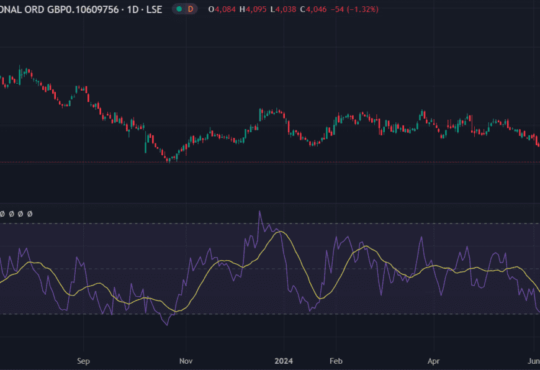
- Melrose leads the way with shares up 73% over the last six months
- Online retailer Ocado has struggled with shares down 43%
- Experts gave some insight into the risers and fallers performance
Markets have not had an easy six months – inflation remains high and no sooner had banking stabilised after the SVB and Credit Suisse crises then US politicians started causing debt default worries.
Despite all this, some companies managed to make significant gains over the last six months.
Those in the FTSE 100, the index made up of the 100 biggest companies listed in London by market share, saw increases of up to 73 per cent in their share price.
Indeed, the FTSE 100 on 1 June 2023 was at almost exactly the same level as it started the year – at 7,490 points versus 7,451.
While companies in the FTSE 250, the index containing the next 250 biggest companies by market share, saw increases of up to 72 per cent.
The FTSE 250 index too is at almost exactly the same level as it was at the start of the year.
Related Articles
HOW THIS IS MONEY CAN HELP
A quick glance at the FTSE winners and losers over the last six months suggests a diverse bunch of names and sectors.
On the winners’ side, we have everything from gambling stocks and hotels, to jet engine companies – while on the losing side we have online food retailer Ocado, lumped in with a bunch of energy companies.
We asked experts why these companies did so well over the last six months and whether this performance could continue.
Biggest winners over the last six months
There are a couple of overarching themes that explain the success of the FTSE risers.
Michael Field, Morningstar’s European equity strategist said: ‘First, the customer is king.
‘High inflation and weak economic growth have meant consumers are thinking hard about where to spend their money. The answer, mostly, has been on experiences over things.
Mitchells & Butlers, owner of restaurant chains such as Harvester, is just one name on the list that has been a beneficiary of this more focused consumer spending.
Sophie Lund-Yates, lead equity analyst at investment platform Hargreaves Lansdowne said the rebound in travel also explains the success of companies exposed to this sector.
‘This is the first summer season that’s been properly disruption free since Covid, helping the likes of airline Wizz Air and Rolls Royce, which makes engines for long haul aircraft, gain altitude.’
‘The depth of the cuts to Rolls Royce’s valuation is also what’s allowed the rebound to be so strong and there’s been an audible sound of relief from investors.’
‘It’s also refreshing to see some retailers performing well, in what has been a very difficult period for the sector.
‘The market has also been very complimentary towards Marks & Spencer, which is in response to the group’s well-executed strategy shift,’ she added
This has seen its clothing and food propositions improve dramatically.
Richard Hunter, head of markets, at interactive investor zoned in on gambling company Flutter Entertainment up by 38 per cent over the last six months.
He explained that: ‘The recent first quarter update in May reported a ‘very strong’ US performance. This added to the previous bounce at the full year results, where investor excitement continued to build around prospects for Flutter.’
Will this success continue? Hunter says: ‘Further out, Flutter estimates that the addressable sports betting market will reach over $40 billion by 2030, more than 4.5 times greater than today, and the group’s increasing presence and profile bode well for prospects.
‘The group’s potential growth, particularly in the US, seem extremely promising.’
Household name Wetherspoon saw gains of 65 per cent over the last six months.
At its recent update in May, Wetherspoons raised a small glass after returning to pre-pandemic levels of trading, and then some.
Hunter commented: ‘It expects earnings for this year to be at the top end of estimates, with 2023 potentially being a record year for sales.
‘Sales in Easter week were the highest-ever for the company and, compared to the whole of last year, like-for-like sales increased by 12.2 per cent in the third quarter and by 12.7 per cent in the year to date.
‘With the group’s value for money offerings at its outlets continuing to appeal to a cash-conscious consumer, the group is currently seeing the benefit of being in line with the economic times,’ he added.
And the losers…
Inflation has meant that cash-strapped consumers have been cutting back by buying less, or switching to cheaper items.
This has lead to falling revenues and share price for Ocado, down nearly 43 per cent, to the degree that the stock was almost demoted from the FTSE 100 this week.
Hunter explains: Ocado is caught between a rock and a hard place, as the two elements of its business (Solutions and Retail) continue to face different tests.
‘The solutions business, on which most of the group’s hopes for future growth and profitability is pinned, has yet to deliver on a sufficient scale to appease investors.
‘The promises of large-scale adoption for its cutting-edge technology has yet to fully materialise, after some considerable time, which has led to investors shunning the stock in their droves.
Lund-Yates agreed that this has impacted its performance: ‘The tech-side of Ocado, which covers its robotic warehouses, which are set up for other retailers, is also not faring as well as the valuation originally demanded.
‘This is not the capital-light model investors where once led to believe, and the share price is moving to accommodate that shift.’
‘For the retail business, from which the vast majority of revenues are currently derived, the environment is getting tougher.
‘The so-called ‘Covid unwind’ has had an impact as shopping habits normalise, while given some UK economic hardship, customers have begun to seek cheaper product offerings elsewhere.
In terms of Ocado’s future, hunter says: ‘Patience has been wearing thin with the increasing danger of Ocado becoming regarded as a perennial ‘jam tomorrow’ stock. It looks likely to remain under pressure.’
Field pointed out that while falling energy bills is great news for consumers, it is bad news for energy and resource companies who are seeing falling revenues, combined with rising costs.
‘Of the only four stocks to see actual share price declines over the last 6 months, three of them fit this bill,’ Field commented.
Publisher Future was another company that suffered in the last six months, down almost 43 per cent.
Hunter said: ‘At its latest update in May, the shares fell by as much as 15 per cent on the day, as the media group lowered its expectations for the full year against challenging market conditions.
‘The publisher’s titles include the likes of Country Life, Marie Claire, and Music Week, and the group reported sales which were down by 10 per cent.’
‘The outlook was equally disappointing, with the company saying that the current trends were likely to continue ‘with challenging market conditions impacting audience,’
Asked whether the performance of these companies will continue, Lund-Yates said: ‘Looking to the rest of the year, uncertainty remains rife.
‘A big question mark hangs over the ability of UK businesses to pass on rising costs to consumers.
‘Business confidence is currently much higher than consumer confidence, suggesting price hikes aren’t a sustainable strategy,’ she added.
Some links in this article may be affiliate links. If you click on them we may earn a small commission. That helps us fund This Is Money, and keep it free to use. We do not write articles to promote products. We do not allow any commercial relationship to affect our editorial independence.






